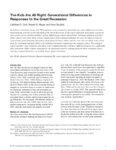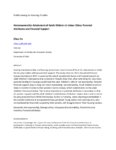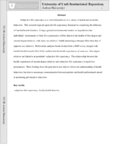1 - 25 of 8
| Creator | Title | Description | Subject | Date | ||
|---|---|---|---|---|---|---|
| 1 |
 |
Zick, Cathleen D.; Srisukhumbowornchai, Sivithee | Does housework matter anymore? The shifting impact of housework on economic inequality | In recent years, American women's housework time has declined while American men's housework time has risen. We examine how these changes have affected economic inequality in America. Using time-diary data from the Time Use in Economic and Social Accounts, 1975-76 (N=1,484) and the American Time Use... | Demography; Socioeconomic status; Household duties; Female; Male; United States; Economics | 2006-09-25 |
| 2 |
 |
Zick, Cathleen D. | The kids are all right: Generational differences in responses to the great recession | Data from a university survey of 2,799 employees were examined to determine age cohort differences in retirement planning activities in the aftermath of the Great Recession. A life course approach and logistic regression were used to assess whether members of four different age cohorts altered their... | 2012-01-01 | |
| 3 |
 |
Yu, Zhou | Homeownership Attainment of Adult Children in Urban China: Parental Attributes and Financial Support | Soaring homeownership and housing prices have made it more difficult for newcomers to climb the housing ladder without parental support. This study relies on China Household Finance Survey microdata in 2015 to examine the role of parental attributes and financial support on adult children's homeowne... | Demographics; Intergenerational mobility; Parental income transfers; Parental attributes | 2017 |
| 4 |
 |
Zick, Cathleen D. | Family, frailty, and fatal futures? Own-health and family-health predictors of subjective life expectancy | Subjective life expectancy is a powerful predictor of a variety of health and economic behaviors. This research expands upon the life expectancy literature by examining the influence of familial health histories. Using a genetic/environmental model, we hypothesize that individuals' assessments of th... | 2014-01-01 | |
| 5 |
 |
Smith, Ken R. | Fertility intentions following testing for a BRCA1 gene mutation | Objective: To test whether fertility intentions differed among persons who tested positive, tested negative, or did not know their genetic status for a mutation of the BRCA1 gene. Method: Participants were members of a large Utah-based kindred with an identified mutation at the BRCA1 locus. Particip... | Genetic testing; Fertility; Risk notification: BRCA1 | 2004 |
| 6 |
 |
Yu, Zhou | Regional disparities in homeownership trajectories: impacts of affordability, new construction, and immigration | In contrast to the 1980s, we find substantial increases in the homeownership rates of young adults in the 1990s. Focusing on the younger half of the baby boom generation, aged 35 to 44 in 2000, we explore the factors that caused steeper trajectories into homeownership in some ... | Demographics; Homeownership; Immigration | 2005 |
| 7 |
 |
Fan, Jessie Xiaojing; Wen, Ming | Disparities in healthcare utilization in China: do gender and migration status matter? | Using a multi-stage cluster sampling approach, we collected healthcare and demographic data from 531migrants and 529 local urban residents aged 16-64 in Shanghai, China. Logistic regressions were used to analyze the relationship between gender-migration status and healthcare utilization while contr... | 2012 | |
| 8 |
 |
Brown, Barbara B. | Crime, new housing, and housing incivilities in a first-ring suburb: multilevel relationships across time | Concepts deriving from criminology, housing policy, and environmental psychology are integrated to test two ways that housing conditions could relate to crime in a declining first-ring suburb of Salt Lake City. For existing housing, we use a model to test whether housing incivilities, such as litte... | Community development; Community revitalization; Crime; Urban policy | 2004 |
1 - 25 of 8
